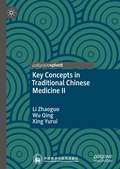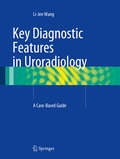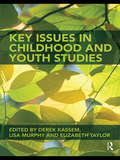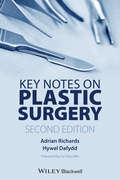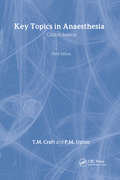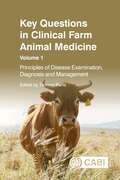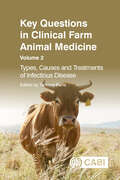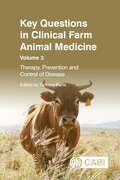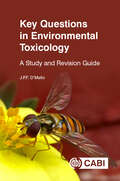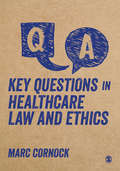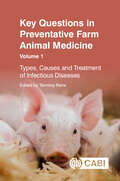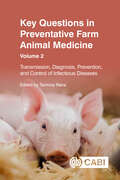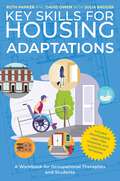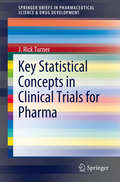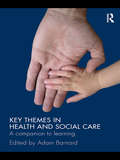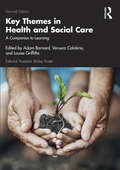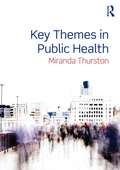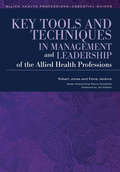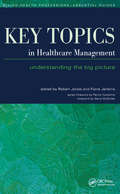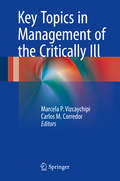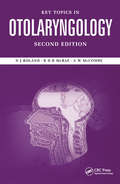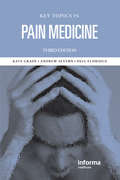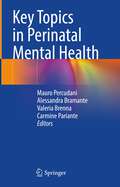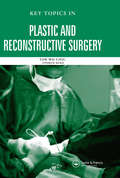- Table View
- List View
Key Concepts in Traditional Chinese Medicine II
by Li Zhaoguo Wu Qing Xing YuruiThis book offers an overview of Chinese medicine terminology translation, defining the central concepts in Chinese traditional medicine, providing simplified Chinese characters, Mandarin Pronunciation in pinyin, citations for 110 of the most key concepts in traditional Chinese medicine and culture. Covering definitions of terms relating to visceral manifestation, meridians, etiology, pathogenesis, and treatment principles in traditional medicine, it offers a selection of English versions of each term in addition to a standard of English version, drawing on the translation history of traditional Chinese medicine. It provides a useful resource to understand the fundamental terms of traditional Chinese medicine and culture in Chinese and English, and their relevance to cross-cultural discourse.
Key Diagnostic Features in Uroradiology
by Li-Jen WangThis book presents a wealth of images of the different diseases and conditions encountered in the field of uroradiology with the aim of enabling the reader to recognize lesions, to interpret them appropriately and to make correct diagnoses. The images have been selected because they depict typical or classic findings and provide a route to lesion recognition that is superior to memorization of descriptions. The imaging modalities represented include CT, CT angiography, CT urography, MRI, MRA, MRU, diffusion-weighted MRI and ADC mapping, dynamic contrast-enhanced MRI, sonography, conventional angiography, excretory urography, retrograde pyelography, cystography, urethrography and voiding cystourethrography. For each depicted case, important imaging features are highlighted and key points identified in brief accompanying descriptions. Readers will find that the book provides excellent guidance in the selection of imaging modalities and facilitates diagnosis. It will be an ideal ready source of information on key imaging features of urinary tract diseases for medical students, residents, fellows and physicians handling these diseases.
Key Issues in Childhood and Youth Studies
by Elizabeth Taylor Lisa Murphy Derek KassemKey Issues in Childhood and Youth Studies presents an informed and critical commentary on a range of key issues related to children and childhood, from birth to eighteen years. Challenging current orthodoxies within the adult world on the nature of childhood, it is an essential text for students of childhood and youth studies as well as those studying relevant professional qualifications in social work, teaching and health. Exploring ideas from the historical development of childhood to the demonising of youth, it is divided into five clearly defined sections, each with their own editorial introduction which highlights the key themes. The sections focus on: the concept and creation of childhood child development ideas of risk, protection and childhood the politics of childhood international perspectives on childhood. This invaluable textbook provides an overview of childhood and youth studies and encourages students to think about the issues discussed and to develop their own ideas. Each chapter contains student activities, key concept boxes, recommended further reading and a reflection exercise.
Key Notes on Plastic Surgery
by Hywel Dafydd Adrian RichardsThis is the new edition of the concise but comprehensive handbook that should be owned by all surgical trainees specialising in plastic surgery. Taking a pithy systematic approach, Key Notes on Plastic Surgery offers the latest developments within the field in bullet point form and includes key papers for viva voces. It is informed by the current FRCS (Plast) curriculum, making it ideal preparation for the UK exit examination or equivalent international board exam. Key featuresFully covers the entire scope of plastic surgeryClearly divided into 10 sections with logical subheadings for easy fact-findingActs as an adjunct to the established longer textsBrand new chapter on ethics and the law - a compulsory component of the oral examinationIllustrations outlining key surgical procedures and relevant anatomy Fully revised to include all the latest clinical guidelines, Key Notes on Plastic Surgery is the perfect rapid reference tool for trainees in plastic surgery and dermatologic surgery who require quick, accurate answers.
Key Questions in Anesthesia, Third Edition: Clinical Aspects
by T.M. CraftThis second edition contains 360 multiple choice questions arranged as practice papers of 90 questions each. The format is that used for the examination for Fellowship of the Royal College of Anaesthetists. Key Questions in Anaesthesia Second Edition is an essential revision aid for all anaesthetists.
Key Questions in Clinical Farm Animal Medicine, Volume 1: Principles of Disease Examination, Diagnosis and Management (Key Questions)
by Aditya Pratap Anil Kumar Praveen Kumar D. Sumathi Sonam Bhatt Kanchan Arya Ranbir Singh Jatav Vaishali Kumre Vipin Maurya Shashi Pradhan K. S. Prasanna Sunil Punia Neha Rao Mitali Singh S. Sivaraman L. Sowmiya S. Yogespriya Jigyasa RanaProviding well over 1,500 questions to test your knowledge of clinical farm animal medicine, the book has been produced in a convenient format so that it can be used at any time in any place. Each chapter starts with a brief introduction to the topic before providing relevant multiple-choice questions. Covering clinical veterinary medicine for common livestock species, this book includes questions about: - clinical examination; - electrolyte balance and fluid therapy; - diseases by body system, including respiratory, endocrine, cardiovascular, nervous, digestive and musculoskeletal. Including a full chapter introducing general concepts of clinical disease, this self-test resource for students provides a convenient and useful current source of information to anyone interested in learning, revising and assessing their knowledge.
Key Questions in Clinical Farm Animal Medicine, Volume 2: Types, Causes and Treatments of Infectious Disease (Key Questions)
by Anil Kumar Praveen Kumar Sunil Punia A Ashwini B. K. Bhagya Sabita Behera Dipanwita Bhattacharya Banothu Dasmabai Nourhan Eissa Lesley Farms G.K. Chetan Kumar Lunavat Gopala Ola H. Harb Abbas Rabiu Ishaq Dayanidhi Jena Ankesh Kumar Archana Mahapatra Ram Niwas R. Nethra Pratistha ShrivastavaProviding well over 1,500 questions to test your knowledge of clinical farm animal medicine, the book has been produced in a convenient format so that it can be used at any time in any place. Each chapter starts with a brief introduction to the topic before providing relevant multiple-choice questions. Covering clinical veterinary medicine for common livestock species, this book includes questions about: - diseases of the reproductive, integumentary and urinary systems; - anaesthesia and pain management; - perinatal and geriatric diseases. With full chapters also covering diseases of the eye and ear, this self-test resource for students provides a convenient and useful current source of information to anyone interested in learning, revising and assessing their knowledge.
Key Questions in Clinical Farm Animal Medicine, Volume 3: Therapy, Prevention and Control of Disease (Key Questions)
by Alok Mishra Abhishek Pathak Manoj Kumar Ahirwar D Sai Bhavani P Rama Devi G. S. Harita Babu Lal Jangir K. Sindhu Deepika Lather Vikas Nehra P. Ramesh G. S. Haritha R. S. Sethi Dr Nasrul Shaikh Brejesh Singh Amita Tiwari Shivangi UdainiyaProviding well over 1,500 questions to test your knowledge of clinical farm animal medicine, the book has been produced in a convenient format so that it can be used at any time in any place. Each chapter starts with a brief introduction to the topic before providing relevant multiple-choice questions. Covering clinical veterinary medicine for common livestock species, this book includes questions about: - diseases of the haemolymphatic and immune system; - metabolic, genetic, neonatal and deficiency diseases; - poisoning. Including a full chapter covering emergency and critical care, this self-test resource for students provides a convenient and useful current source of information to anyone interested in learning, revising and assessing their knowledge.
Key Questions in Environmental Toxicology: A Study and Revision Guide (Key Questions)
by J P D'MelloKey Questions in Environmental Toxicology is designed as a self-study tool for undergraduate students. Questions review the origin, characterization and environmental distribution of major pollutants, followed by their absorption and metabolic disposition in living organisms. They address implications for the development of cancer, cardiovascular disease, pulmonary dysfunction and neurological conditions in relation to gaseous pollutants, particulates, persistent organic compounds and radioactive emissions, then cover the impact of pollutants on biodiversity, food safety, and water contamination. This book: - Covers toxicology from human morbidity, ecological impact and biodiversity perspectives, and emphasises the impact of diverse organic pollutants in worsening these interconnected phenomena, leading to wider environmental emergencies; - Provides a selection of fill-in-the-gap, multiple choice and short answer question types for students to vary their learning and enhance motivation; - Includes full answer rationales, allowing students to gain true insight into the subject. Providing support to programmes across environmental science, ecology and human health, and covering all the major biological toxins and pollutants as well as unintended consequences of actions designed to improve outcomes, this book may be used in conjunction with the companion volume Introduction to Environmental Toxicology.
Key Questions in Healthcare Law and Ethics
by Marc CornockThe perfect textbook for healthcare students who want a fresh, innovative way to understand how law and ethics relate to their studies, placements, and professional practice. By using a unique format made up of frequently asked questions and corresponding answers, Key Questions in Healthcare covers the what, why, where and how in legal and ethical issues related to healthcare. Its easy-to-use layout helps you quickly find informative yet straightforward answers to over 150 questions, helping you to feel confident in your legal and ethical knowledge, without leaving you overwhelmed or confused. All answers are written in-line with Nursing and Healthcare regulations and its conversational writing style will make you feel like you are talking with a lecturer, instructor, or knowledgeable colleague, rather than reading a textbook. The book is appropriate for all levels, from healthcare students in the initial stages of their education, to the advanced practitioner who wishes to refresh their knowledge, or maybe learn something new.
Key Questions in Healthcare Law and Ethics
by Marc CornockThe perfect textbook for healthcare students who want a fresh, innovative way to understand how law and ethics relate to their studies, placements, and professional practice. By using a unique format made up of frequently asked questions and corresponding answers, Key Questions in Healthcare covers the what, why, where and how in legal and ethical issues related to healthcare. Its easy-to-use layout helps you quickly find informative yet straightforward answers to over 150 questions, helping you to feel confident in your legal and ethical knowledge, without leaving you overwhelmed or confused. All answers are written in-line with Nursing and Healthcare regulations and its conversational writing style will make you feel like you are talking with a lecturer, instructor, or knowledgeable colleague, rather than reading a textbook. The book is appropriate for all levels, from healthcare students in the initial stages of their education, to the advanced practitioner who wishes to refresh their knowledge, or maybe learn something new.
Key Questions in Preventative Farm Animal Medicine, Volume 1: Types, Causes and Treatment of Infectious Diseases (Key Questions)
by Chetan D. Chavda Bhupamani Das Aishwarya Dash H. Dhanalakshmi Abrar Ul Haq Biswa Ranjan Jena J. Jyothi Jaysukh B. Kathiriya M. Bhavya Sree Sivajothi SrigireddyProviding well over 1,000 questions to test your knowledge of preventative farm animal medicine, the book has been produced in a convenient format so that it can be used at any time in any place. Each chapter starts with a brief introduction to the topic before providing relevant multiple-choice questions. Covering preventative veterinary medicine for common livestock species, the book includes questions on: - general concepts of preventative medicine; - viral, bacterial, fungal and mycoplasma diseases; - ecto- and endo-parasitic infections. This self-test resource for students provides a convenient and useful current source of information to anyone interested in learning, revising and assessing their knowledge.
Key Questions in Preventative Farm Animal Medicine, Volume 2: Transmission, Diagnosis, Prevention, and Control of Infectious Diseases (Key Questions)
by Anil Kumar Surbhi Gupta Sonam Bhatt Snehil Gupta Sushma Gupta K. Jayalakshmi K. Karthika Simant Kumar Nanda Arpita Padhy Abhishek Pathak Jigar Raval Amit Ranjan Sahu Rajesh Kumar Sahu Barkha Sharma Jitendra TiwariProviding well over 1,000 questions to test your knowledge of preventative farm animal medicine, the book has been produced in a convenient format so that it can be used at any time in any place. Each chapter starts with a brief introduction to the topic before providing relevant multiple-choice questions. Covering preventative veterinary medicine for common livestock species, the book includes questions about: - rickettsial and protozoan diseases; - prophylaxis in animals; - diagnostic techniques; - collection, preservation, processing and dispatch of clinical materials. Including a full chapter considering important transboundary, emerging and exotic diseases, this self-test resource for students provides a convenient and useful current source of information to anyone interested in learning, revising and assessing their knowledge.
Key Skills for Housing Adaptations: A Workbook for Occupational Therapists and Students
by David Owen Ruth Parker Julia BadgerKey Skills for Housing Adaptations delves into the crucial role occupational therapists play in helping people with additional needs adapt their homes in order to give them a better quality of life. Highlighting the long-term benefits environmental adjustments can afford, this accessible and practical book combines key skills needed to carry out home adaptations, from professional reasoning skills and cultural considerations to relevant legislation and the roles and remits of people working in the field.Supplemented with knowledge checks preceding every chapter, practical exercises, and case studies as well as digital resources including examples of architectural plans and videos that bring the theory to life, this is a comprehensive and essential tool for both new and seasoned occupational therapists looking to make a positive impact on clients' home lives.
Key Statistical Concepts in Clinical Trials for Pharma
by J. Rick TurnerThis Brief discusses key statistical concepts that facilitate the inferential analysis of data collected from a group of individuals participating in a pharmaceutical clinical trial, the estimation of their clinical significance in the general population of individuals likely to be prescribed the drug if approved, and the related decision-making that occurs at both the public health level (by regulatory agencies when deciding whether or not to approve a new drug for marketing) and the individual patient level (by physicians and their patients when deciding whether or not the patient should be prescribed a drug that is on the market). These concepts include drug safety and efficacy, statistical significance, clinical significance, and benefit-risk balance.
Key Themes in Health and Social Care: A Companion to Learning
by Adam BarnardKey Themes in Health and Social Care is a learning resource for students in health and social care. It provides an overview of foundational issues and core themes in the field and introduces key areas of debate, moving from an introductory level to in-depth discussion as the book progresses. Divided into three parts: the first part sets the scene, addressing introductory psychology and sociology, social policy, equality and diversity, skills for practice, and working with people the second part considers key themes such as the contribution of philosophy and politics; criminal justice; management of services; the relationship between place and wellbeing; research in health and social care; theories of counselling; housing and the built environment the third part looks at discrete areas of practice such as mental health; substance abuse, protection work; health promotion; disability studies; working with men; child welfare and public responsibility. Each chapter begins with an outline of the content and learning outcomes and includes reflective exercises to allow students to reflect on what they have read, review their learning and consolidate their understanding. Time-pressed readers wanting to ‘dip into’ the book for relevant areas can do so but, read from cover to cover, the book provides a comprehensive introduction to the key areas of contemporary health and social care practice. It will be particularly helpful for students undertaking health and social care undergraduate and foundation degrees.
Key Themes in Health and Social Care: A Companion to Learning
by Adam Barnard Verusca Calabria Louise GriffithsThis revised and expanded second edition of Key Themes in Health and Social Care is a learning resource for students in health and social care. It provides an overview of foundational issues and core themes in the field and introduces key areas of debate, moving from an introductory level to in-depth discussion as the book progresses. Divided into three parts: the first part sets the scene, addressing introductory psychology and sociology, social policy, equality and diversity, skills for practice, and working with people the second part considers key themes such as mental health and wellbeing; management of services; the relationship between place and wellbeing; research in health and social care; and person-centred interventions the third part looks at discrete areas of practice such as mental health; ageing, leading and managing health and social care; working with vulnerable populations; and health promotion Each chapter begins with an outline of the content and learning outcomes and includes reflective exercises to allow students to reflect on what they have read, review their learning and consolidate their understanding. Time-pressed readers wanting to ‘dip into’ the book for relevant areas can do so but, read from cover to cover, the book provides a comprehensive introduction to the key areas of contemporary health and social care practice. It will be particularly helpful for students undertaking health and social care undergraduate and foundation degrees.
Key Themes in Public Health
by Miranda Thurston‘The growth of public health courses aimed at undergraduates has created a new need for textbooks that are appropriate and stimulating. Miranda Thurston has succeeded in producing something which strikes the right note. It is wide ranging in scope without being superficial and is accessible to the young learner. It is a sort of 'Wiki'. Just what the aspiring public health practitioner ordered.’ – Professor John R. Ashton C.B.E., President of the UK Faculty of Public Health. Key Themes in Public Health comprises a series of introductory essays exploring key themes and concepts in public health. Ranging from political and economic concern with improving population health and reducing health inequalities, to debates about how to protect populations from new health threats, as well as a concern with individual responsibility for lifestyles and behaviour, the themes discussed include: determinants of health, globalisation, evidence, climate change, ethics, development, poverty, risk and population. Presenting provocative ways of thinking about key ideas in a concise fashion, each essay provides a basic grounding in the relevant theme as well as a departure point for further study by: Defining the theme in an accessible way Placing each idea in its particular social, political, economic and historical context Illustrating its application and significance for public health Identifying and exploring issues surrounding each of the themes This text provides an accessible overview for students new to public health who want to get to grips with the full range and complexity of this diverse and multidisciplinary field.
Key Tools and Techniques in Management and Leadership of the Allied Health Professions
by Robert Jones Fiona JenkinsThe Allied Health Professions - Essential Guides series is unique in providing advice on management, leadership and development for those in the Allied Health Professions (AHP). This highly practical volume offers a wide range of assessment tools and techniques in such critical areas as management quality, organisational and management structure, benchmarking, capacity and demand management, care pathway design, activity analysis, report writing and presentation skills. The layout is conducive to easy comprehension; tables, figures and boxed text aid quick reference and everyday application, and many of the resources are also provided on a complimentary CD. With contributions from internationally renowned professionals Key tools and techniques in management and leadership of the allied health professions provides tools that will be vital to all allied health professionals interested in providing timely, efficient and cost-effective care for their patients. These will include AHP managers and aspiring managers, senior clinicians, extended scope practitioners, clinical specialists, AHP educators, researchers, staff and students. 'The NHS is facing the greatest period of challenge in its history. The key to success is leadership. Allied Health Professionals will be a central part of this leadership response. In this work, Robert and Fiona continue their series supporting Allied Health Professionals in that leadership journey. It is an important contribution to this critical effort.' From the Foreword by Jim Easton
Key Topics in Healthcare Management: Understanding the Big Picture (Radcliffe Ser.)
by Robert Jones Fiona JenkinsInformation is a key resource to primary health care and is increasingly required in individual practices. This book will demystify the subject, which is often presented in complex terms. It sets out in a simple and interesting way what information those working in primary care will need, the systems required to deliver them and how to set them up. Information and IT for Primary Care uses exercises, stories, key points, case studies, model answers and think boxes. Worldwide web links refers the reader to resources and shows how to get the most out of your computer. The book is user-friendly, jargon free and based on primary research evidence. It is essential reading for everyone working in primary care organisations including GPs, practice managers and nurses, and staff working in community trusts and the NHS.
Key Topics in Management of the Critically Ill
by Marcela P. Vizcaychipi Carlos M. CorredorThis book is designed to assist clinicians who are new to intensive care by providing information on a range of important and novel topics of relevance in the day-to-day management of critically ill patients. Guidance is given on the appropriate response to various emergencies and circumstances, including stroke, acute liver failure, severe burns, extreme pain, and delirium. The role of simulation training in the intensive care unit is discussed, and detailed attention is devoted to the application of modern techniques for the assessment of vital organs in the critical care setting, such as echocardiography and lung ultrasound. An individual chapter focuses on regional anesthesia in intensive care, and in addition the book addresses subjects and issues that are frequently neglected. Examples include transfer of the critically ill patient, the role of forgotten electrolytes such as magnesium, the use of non-coumarin anticoagulants, and neuropsychological rehabilitation. The book will have broad appeal, including for general intensivists, anesthetists, acute medicine physicians, and medical students attached to acute specialties or preparing for exams in intensive care medicine.
Key Topics in Otolaryngology
by Nj. Roland R.D.R. Mcrae A. W. MccombeKey Topics in Otolaryngology second edition provides essential information on 100 major subjects pertinent to modern clinical practice in otolaryngology and head and neck surgery. This edition has been comprehensively updated to reflect recent changes in the field. It contains new chapters on medicolegal issues in ENT surgery, clinical governance a
Key Topics in Pain Management
by Kate M. Grady Andrew M. SevernThe Third Edition of this best-selling guide to the Key Topics in Chronic Pain has now expanded its remit to include material on acute pain management also. In addition, the existing material has been completely updated to reflect new activity in the field of anti-inflammatory drugs and physiotherapy, amongst other topics.
Key Topics in Perinatal Mental Health
by Mauro Percudani Alessandra Bramante Valeria Brenna Carmine ParianteThe book offers a comprehensive and up-to-date overview of key issues in perinatal mental health. Classic topics such as screening, assessment, pharmacological, psychological and psychosocial interventions of the most common conditions (depression, anxiety disorders, etc.) are combined with lesser known issues, such as mother-infant relationship disorders or thoughts of infant-related harm and aggressive behaviors, sleep disturbances in puerperium, obsessional disorders, fetal death etc., paying particular attention to specific groups of perinatal patients like mothers with cancer, adolescents, fathers, migrants, and preterm babies. The chapters written by health professionals working in hospitals, community services or voluntary agencies alternate with contributions from researchers whose fields of expertise include biology and neuroscience, diagnosis and special needs, treatment and prognosis, etc., striking a balance between scientific investigation and clinical practice.The book offers a valuable tool for a wide range of professionals like psychiatrists, psychologists, gynecologists, midwives, oncologists, pediatricians, and social workers, who want to improve their clinical practice and the effectiveness of their treatment pathways using evidence from perinatal health research.
Key Topics in Plastic and Reconstructive Surgery
by Tor Wo Chiu Andrew BurdBased on the teaching of plastic and reconstructive surgery at a university hospital, Key Topics in Plastic and Reconstructive Surgery is a unique resource that provides succinct guidance to the core topics in this rapidly developing field for all student surgeons. Using clear, descriptive prose and illustrations as necessary to explain the importa
